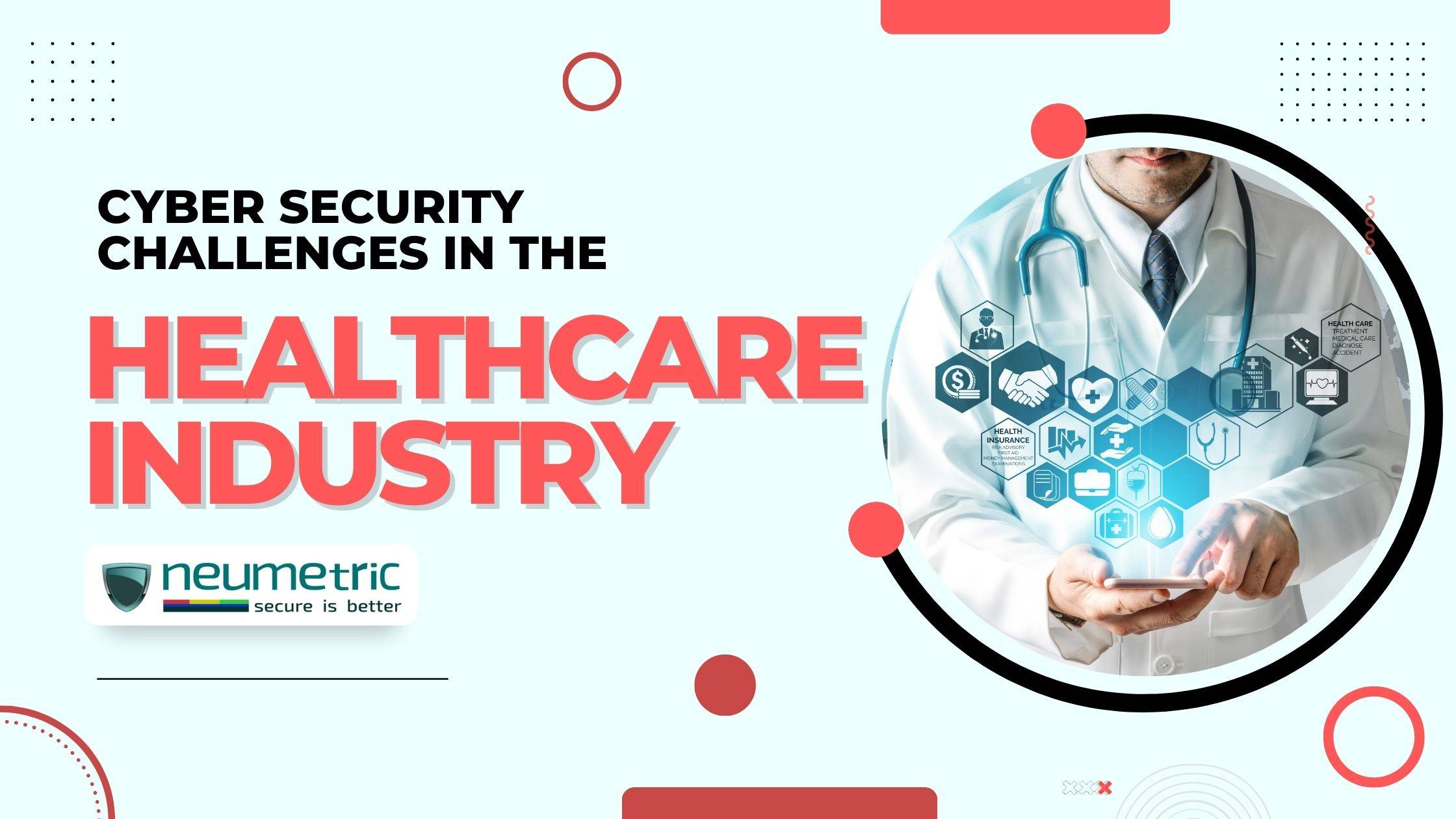Table of Contents
ToggleIntroduction:
Cybersecurity refers to the practice of protecting computer systems, networks & data from unauthorized access, use, disclosure, disruption or destruction. It involves implementing a combination of technologies, processes & practices to safeguard information & prevent cyber threats.
In the Healthcare Industry cybersecurity is of paramount importance due to the sensitive nature of the data involved. Healthcare organizations store & transmit vast amounts of Personal Health Information [PHI] & Electronic Medical Records [EMRs], making them attractive targets for cybercriminals. Breaches in healthcare systems can lead to serious consequences, including compromised patient privacy, medical identity theft, disruption of healthcare services, financial losses & reputational damage to healthcare providers.
This Journal will focus on the challenges in healthcare cybersecurity, highlighting the specific risks & vulnerabilities faced by the industry. It will delve into the evolving threat landscape, motivations behind cyber attacks in healthcare & examples of major cyber incidents. The Journal will also explore the unique challenges posed by the complexity of healthcare systems, compliance with regulatory requirements (such as HIPAA in the United States) & the increasing adoption of digital technologies in healthcare.
Additionally, we shall also discuss common vulnerabilities in healthcare systems & provide insights into strategies & best practices to enhance cybersecurity in the healthcare industry. By understanding & addressing these challenges, healthcare organizations can safeguard patient data, maintain the integrity of their systems & ensure the delivery of high-quality care in a secure digital environment.
Overview of the Healthcare Industry:
The Healthcare Industry has undergone a significant digital transformation in recent years. Traditional paper-based systems have given way to advanced technologies & digital solutions that streamline processes, enhance patient care & improve overall efficiency. This digital transformation has revolutionized how healthcare organizations store, manage & share patient information, leading to the adoption of Electronic Health Records [EHRs] & other digital tools.
One of the key advancements in the healthcare industry is the widespread adoption of Electronic Health Records [EHRs]. EHRs are digital versions of patient medical records that provide healthcare professionals with easy access to comprehensive patient information, including medical history, lab results, prescriptions & more. Additionally, telemedicine has gained prominence, allowing healthcare providers to remotely diagnose & treat patients through video consultations.
The adoption of technology in healthcare brings numerous benefits. EHRs improve the accessibility & accuracy of patient information, leading to better care coordination & informed decision-making. Telemedicine enables remote access to healthcare services, particularly in underserved areas or during emergencies. Wearable devices & remote monitoring systems help in tracking patient health metrics, detecting early warning signs & promoting proactive healthcare. Data analytics & AI facilitate the analysis of large datasets, leading to valuable insights for personalized treatments, predictive modelling & population health management. Blockchain Technology ensures secure & tamper-proof storage & sharing of patient data, enhancing privacy & data integrity.
Growing Threat Landscape in Healthcare Cyber Security:
The Healthcare Industry has experienced a significant increase in cyber attacks in recent years. Cybercriminals view healthcare organizations as lucrative targets due to the vast amount of valuable patient data they possess. These attacks can take various forms, including ransomware attacks, data breaches, phishing scams & insider threats.
The motives behind cyber attacks on healthcare organizations can vary. One primary motive is financial gain, where attackers seek to exploit valuable patient data for identity theft, insurance fraud or selling on the black market. Ransomware Attacks have become increasingly prevalent, with attackers encrypting critical healthcare systems & demanding a ransom in exchange for restoring access. Another motive is disruption, where cyber attackers aim to disrupt healthcare services & cause chaos, potentially putting patient lives at risk. Additionally, state-sponsored attacks may target healthcare organizations to gain access to sensitive research, intellectual property or compromise critical infrastructure.
Several major cyber attacks have targeted the healthcare sector in recent years. For example, the WannaCry ransomware attack in 2017 impacted numerous healthcare organizations worldwide, causing significant disruptions & financial losses. In 2020, the cyberattack on the University Hospital Düsseldorf in Germany resulted in the death of a patient as the hospital’s systems were paralyzed. The attack underscored the potential life-threatening consequences of healthcare cyber attacks.
These examples highlight the severity of cyber threats faced by the healthcare industry. It is crucial for healthcare organizations to implement robust cybersecurity measures & stay vigilant against evolving threats to protect patient data, maintain the continuity of care & safeguard the integrity of healthcare systems.
Unique Cyber Security Challenges in Healthcare :
The Healthcare Industry possesses a complex & diverse IT infrastructure comprising various interconnected systems, devices & applications. Healthcare organizations often have legacy systems that may lack modern security features, making them vulnerable to cyber attacks. Additionally, the increasing adoption of Internet of Things [IoT] devices, mobile apps & telehealth technologies further complicates the security landscape, as each component introduces potential entry points for attackers.
Many healthcare organizations struggle with inadequate security measures & resource limitations. Limited budgets & resources can hinder the implementation of robust cybersecurity measures, leaving healthcare systems vulnerable to attacks. Moreover, there may be a lack of dedicated cybersecurity personnel & expertise within healthcare organizations, making it challenging to effectively address & mitigate cyber threats.
Human factors play a significant role in healthcare cybersecurity. Employees, including healthcare professionals & staff, can unknowingly introduce vulnerabilities through actions such as falling victim to phishing attacks, sharing sensitive information or using weak passwords. Insufficient cybersecurity awareness & training among employees increase the likelihood of successful cyber attacks. Healthcare organizations must prioritize ongoing training programs & promote a culture of cybersecurity awareness to mitigate human-related risks.
Healthcare organizations face stringent regulatory compliance requirements, such as the Health Insurance Portability & Accountability Act [HIPAA] in the United States or the General Data Protection Regulation [GDPR] in the European Union.
Common Vulnerabilities in Healthcare Systems:
One common vulnerability in healthcare systems is the insecure storage & transmission of sensitive patient data. Weak encryption protocols, inadequate access controls & improper handling of data can expose patient information to unauthorized access. This vulnerability can be exploited by cybercriminals to gain access to valuable data or launch data breaches.
Insufficient authentication mechanisms & weak access controls pose significant vulnerabilities in healthcare systems. Weak or easily guessable passwords, lack of multi-factor authentication & improper user access management can allow unauthorized individuals to gain access to critical systems & sensitive patient data. This can lead to data breaches, unauthorized modifications of medical records or unauthorized access to medical devices.
Malware & Ransomware pose significant threats to healthcare systems. Malicious software can be introduced into the system through various means, including phishing emails, malicious websites or infected external devices. Once inside the system, malware can disrupt operations, steal or encrypt sensitive data or gain unauthorized access to network resources. Ransomware attacks specifically can encrypt critical healthcare systems, rendering them inaccessible until a ransom is paid.
Insider threats, including employees with malicious intent or inadvertent mistakes, can pose a significant vulnerability in healthcare systems. This may involve employees intentionally stealing or mishandling patient data or unintentionally falling victim to social engineering attacks. Additionally, unauthorized access by employees or individuals with privileged access can compromise the integrity & confidentiality of patient data.
Impacts of Cyber Attacks in Healthcare:
Cyber Attacks on healthcare systems can result in the compromise of patient data, leading to breaches of privacy & confidentiality. Patient records containing sensitive information, including personal identifiable information & medical histories, can be exposed. This can have severe consequences for patients, including identity theft, financial fraud & psychological distress.
Cyber Attacks can disrupt the normal functioning of healthcare services, causing delays in patient care & treatment. Ransomware attacks, for example, can render critical systems or Electronic Health Record [EHR] systems inaccessible, hindering healthcare professionals ability to access patient information & deliver timely care. Such disruptions can directly impact patient outcomes & healthcare provider efficiency.
Healthcare organizations may experience significant financial losses as a result of cyber attacks. These can include costs associated with incident response, remediation, legal fees, regulatory fines & potential lawsuits. Additionally, cyber attacks can tarnish the reputation of healthcare providers, eroding patient trust & confidence & leading to a loss of competitive advantage.
Healthcare organizations are subject to legal & regulatory requirements, such as HIPAA in the United States or GDPR in the European Union. Failure to adequately protect patient data & comply with these regulations can result in legal consequences, including fines, penalties & potential legal actions. Non-compliance can also lead to reputational damage & loss of trust among patients & partners.
Strategies for Enhancing Healthcare Cyber Security:
Healthcare organizations should establish comprehensive risk assessment & management frameworks to identify & prioritize potential vulnerabilities & threats. This involves conducting regular assessments of their IT infrastructure, identifying weaknesses & implementing appropriate controls & safeguards to mitigate risks.
Healthcare organizations should prioritize the implementation of strong network & system security measures. This includes deploying firewalls, intrusion detection & prevention systems & secure web gateways to monitor & protect their networks. Regular security updates & patching should be applied to mitigate known vulnerabilities. Additionally, segmenting networks & implementing robust access controls can limit the lateral movement of attackers & reduce the potential impact of a breach.
Human factors play a critical role in healthcare cybersecurity. Healthcare organizations should invest in comprehensive employee education & awareness programs to ensure that all staff members, from healthcare professionals to administrative personnel, understand their role in maintaining security. Training should cover topics such as identifying phishing attempts, using strong passwords, practicing good data hygiene & reporting suspicious activities.
Timely software & system updates are crucial to address known vulnerabilities & protect against emerging threats. Healthcare organizations should establish processes to ensure that all software, operating systems & applications are regularly updated with the latest security patches. This includes both on-premises systems & cloud-based infrastructure. Regular patch management practices help to mitigate the risk of exploitation by threat actors targeting known vulnerabilities.
Regular security audits & penetration testing help healthcare organizations identify vulnerabilities & assess the effectiveness of their security measures. These audits should encompass both internal & external assessments to evaluate the organization’s overall security posture. Penetration Testing, performed by ethical hackers, simulates real-world cyber attacks to identify weaknesses & potential entry points.
Collaboration & Information Sharing:
Collaboration among healthcare organizations & security experts is essential in the fight against cyber threats. Sharing knowledge, experiences & best practices enables healthcare organizations to stay informed about the latest threats & preventive measures. Collaborative efforts also foster a sense of community & collective responsibility in addressing cybersecurity challenges, ultimately benefiting the entire healthcare ecosystem.
Healthcare organizations should actively engage in sharing best practices & threat intelligence with their peers. This can occur through information sharing platforms, industry associations or collaborative initiatives. By sharing insights into emerging threats, attack techniques & effective countermeasures, healthcare organizations can collectively strengthen their defenses against cyber attacks.
Healthcare organizations should establish comprehensive incident response & recovery plans to ensure a swift & effective response in the event of a cyber attack. These plans should outline the roles & responsibilities of key stakeholders, the steps to be taken during an incident & the procedures for restoring operations & mitigating the impact. Regular testing & simulation exercises should be conducted to validate the effectiveness of these plans.
Conclusion:
The Healthcare Industry faces significant challenges in ensuring the security of patient data & protecting critical infrastructure. The adoption of robust cybersecurity strategies is essential to mitigate the risks posed by cyber threats. By implementing robust risk assessment & management frameworks, strengthening network & system security, enhancing employee education & awareness programs, regularly updating & patching software & systems, implementing encryption & strong authentication methods & conducting regular security audits & penetration testing, healthcare organizations can significantly enhance their cybersecurity defenses.
Furthermore, collaboration among healthcare organizations & information sharing initiatives are crucial for staying ahead of evolving threats & sharing best practices. By establishing incident response & recovery plans, healthcare organizations can minimize the impact of cyber attacks & swiftly restore operations. Ultimately, the importance of a secure healthcare ecosystem cannot be overstated, as it protects patient privacy, ensures the continuity of care & maintains the trust & confidence of patients & stakeholders. By prioritizing cybersecurity, the healthcare industry can navigate the digital landscape with Resilience & Confidence.
FAQs
- What are the top cyber threats facing healthcare organizations?
The top cyber threats facing healthcare organizations include ransomware attacks, data breaches, phishing & social engineering, insider threats & vulnerabilities in medical devices & Internet of Medical Things [IoMT] systems.
- What are 3 challenges of cyber security?
Three challenges of cybersecurity are the constantly evolving threat landscape, the complexity of modern IT infrastructure & the shortage of skilled cybersecurity professionals.
- What is the main challenge of cyber security?
The main challenge of cybersecurity is staying ahead of rapidly evolving cyber threats & effectively mitigating risks to protect sensitive data & critical infrastructure.





